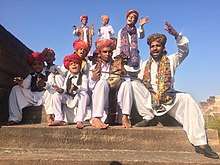Manganiar
The Manganiar and related Langha are Muslim communities in the desert of Rajasthan, India in the districts of Barmer and Jaisalmer, along the border in Sindh province of Pakistan. Significant numbers are also found in the districts of Tharparkar and Sanghar in the province of Sindh in Pakistan. They are knownfor their folk music. They are the groups of hereditary professional musicians, whose music has been supported by wealthy landlords and aristocrats for generations.
 Manganiar children performing with their guru at Mehrangarh Fort, Jodhpur at World Sufi Spirit Fstival in 2016. | |
| Total population | |
|---|---|
| Unknown | |
| Regions with significant populations | |
| Rajasthan, India · Sindh, Pakistan | |
| Languages | |
| Marwari · Sindhi | |
| Religion | |
| Islam |
History and origin
The Manganiars consider themselves descendants of the Rajputs and are renowned as folk musicians of the Thar desert. Their songs are passed on from generation to generation as a form of oral history of the desert. They sing songs about Alexander the Great, about the local Maharajas and past battles in the region. Manganiars have survived for centuries on the patronage of wealthy merchants in caravan towns, particularly Jaisalmer where there is an important settled community today. The traditional jajman (patrons) of the Manganiar are the locally dominant Rajput community, while the Langha have a similar relationship with the Sindhi-Sipahi, a community of Muslim Rajputs. At times of birth, marriage or any family festivity for their Rajput patrons, the Manganiar musicians sing songs of the desert and many specially composed songs to praise the patron and his family .
Though Manganiar and Langhas communities are Muslim, in Rajasthan many Manganiar songs are in praise of Hindu deities and celebrate Hindu festivals such as Diwali and Holi where the performers traditionally invoke the Hindu God Krishna and seek his blessing before beginning their recital.
Present circumstances
In 1978, Jodhpur-based musician Komal Kothari provided the Manganiars with institutional support, allowing them to sing outside the state for the first time. Currently, several Manganiar groups tour internationally.
Socio-political controversy
In present-day Jaisalmer and surrounding regions in Rajasthan, the term Manganiar, or Manganiyar, meaning 'beggar', is used as a debasing and derogatory title for folk musicians that are among the lowest castes in Rajasthan. These communities of folk musicians refer to themselves as Merasi, which translates as 'musicians' or 'keepers of the stories' and had been titled this by patrons, including wealthy and powerful Rajput patrons predating Komal Kothari's usage of Manganiar. Considered ‘untouchable’, denied access to education, healthcare, and political representation, most live in poverty yet aspire to improve their situation. Despite on-going caste-prejudice, they persist in their roles as oral genealogists, storytellers, and musicians. To reclaim their identity as storytellers, the Merasi of Jaisalmer have shed the derogatory caste label 'Manganiyar' and proudly embraced the name 'Merasi', meaning musicians and is also a poignant symbol of self-determination. New York City-based non-profit organization Folk Arts Rajasthan (FAR), partnered with Jaisalmer-based Lok Kala Sagar Sansthan (LKSS), currently seeks to empower the Merasi community through education, community development, and by nurturing and preserving cultural identity.[1]
Instruments
Kamaicha
The 17-string khamaycha is a bowed instrument. Made of mango wood, its rounded resonator is covered with goat skin. Three of its strings are goat intestine while the other 14 strings are steel.
Khartaal
The khartaal is a kind of castanet made of teak. Its name is derived from "Khar", meaning hand, and "Taal", meaning rhythm.
Dholak
The dholak is a hand drum similar in timbre to a bongo. A dholak may have traditional lacing or turnbuckle tuning. The dholak has a simple membrane and a handle on the right hand side. The left hand membrane has a special coating on the inner surface. This coating is a mixture of tar, clay and sand (dholak masala) which lowers the pitch.
Notable people
- Kachra Khan, a singer of the Managniar community of western Rajasthan
- Sakar Khan, Khamaicha player, Padmasree award winner
- Mai Dhai, Pakistani Manganiar folk singer
- Allan Fakir
- Swaroop Khan, playback singer
- Mame Khan, a folk singer
References
- http://www.folkartrajasthan.org/about/ Folk Arts Rajasthan in partnership with Lok Kala Sagar Sansthan, accessed 29 September 2016